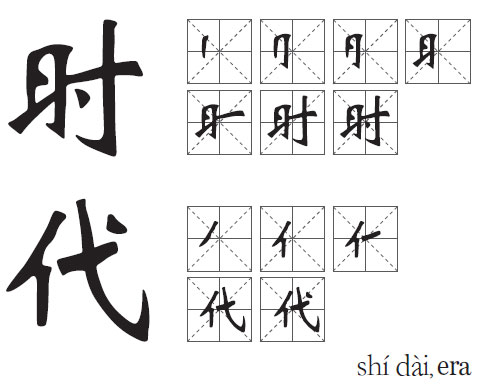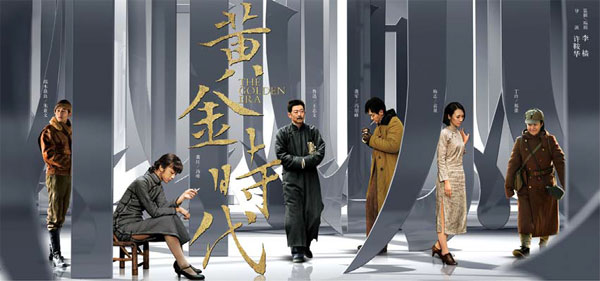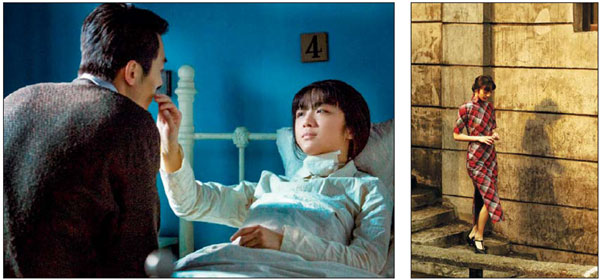Bittersweet times of the golden era

Film delivers dramatization and historical narrative in an unconventional way
There is an underlying sense of woe that pervades Tang Wei's portrayal of Zhang Naiying, best known by her pen name Xiao Hong (萧红), in Ann Hui's newest film The Golden Era.
One might point to its source as perhaps the resentful literary genius who was upstaged by her male counterparts because of the times and the nature of her work. And yet from Tang Wei's subtle laughter and explorations of joy, it is apparent that this woe is far deeper seated than simple resentment. It is complex, multidimensional and is interwoven throughout everything in The Golden Era, and is at the same time so delightfully hard to finger. It is this complex melancholy, combined with Hui's experimental directorial prowess that gives The Golden Era its nuanced, bittersweet, but balanced air.
| A still of the Chinese film The Golden Era directed by Ann Hui. Photos Provided to China Daily |
| Xiao Hong, portrayed by Chinese actress Tang Wei, as a quiet, introverted lady of letters, suffers terrible illness in her final days. |

The story of Xiao Hong is a sad one. Her works were sometimes autobiographical, and others that focused on speaking on behalf of the peasantry are considered key insights into the plight of women in early modern Chinese society.
At the same time she was a writer of unparalleled sensitivity that often led her away from the path of political hand-wringing that many of her peers had long marched down. Her writing style is considered languid and complex - lamenting beauty not out of spite but for its ephemeral nature yet still unable to extricate herself from its intensity.
Even so, Xiao Hong was a student of the May Fourth Movement (五四运动), and though many of her works demonstrated her dedication to her interpretations of socialism, she never saw the rise of the Communist Party to the helm of China. She was killed in Hong Kong during the wartime chaos of 1942.
The bittersweet aspects of her life were not just relegated to her final years; Xiao Hong was born in 1911 to a landowning family. When she fled to Beijing to escape an arranged marriage, her spiteful lover tracked her down, and she was left pregnant and penniless in a hotel. It was here that she met Xiao Jun (萧军), a newspaper reporter with whom she would embark on an exciting, tumultuous life that took her across Chinese mainland to Japan and finally to Hong Kong, where she would find her untimely demise. Over the course of her life she traveled to Chongqing, Wuhan, Beijing, Shanghai, Harbin, Qingdao and Tokyo, as she continued to write, reflecting on her life, and the plight of the Chinese people. The great literary mind Lu Xun (鲁迅) even told her that she was to surpass the legendary Ding Ling as one of the greatest female Chinese writers of the modern age.
Xiao Hong: What's your philosophy of love?
Nǐ duìyú ài de zhéxué shì zěnme jiěshì ne?
你对于爱的哲学是怎么解释呢?
Xiao Jun: What philosophy? Either you love…or you ditch the whole business.
Shěnme zhéxué? ài biàn ài, bú ài biàn diūkāi.
什么哲学?爱便爱,不爱便丢开。
Xiao Hong: What if you can't do that?
Yàoshi diūbukāi ne?
要是丢不开呢?
Xiao Jun: Then you're stuck with it.
Diūbukāi jiù rèn tā diūbukāi ba.
丢不开就任它丢不开吧。
It is a story that could have easily been co-opted by propagandists stirring up the proverbial pot. And yet Hui, with enormous dedication, forgoes the pressures to succumb to this angle in The Golden Era, choosing instead to portray the story of Xiao Hong as truthfully as history will allow. What this means is that the varying accounts of Xiao Hong left to us by her peers, lovers and acquaintances serve as narratives, and those participants in the story break the fourth wall to speak directly to the audience. It is a commendably masterful attempt at admitting the flawed, ambiguous (and human) nature of history, especially during wartime China of the 1930s.
Xiao Hong: What do people live for?
Rén wèishénme huó zhe?
人为什么活着?
Xiao Jun: Why do you live? You have plenty of reasons to kill yourself now.
Nà nǐ wèishénme hái juàn niàn zhè gè shì jiè? Nà nǐ xiànzài zìshā de tiáo jiàn rúcǐ chōng zú.
那你为什么还眷恋这个世界?那你现在自杀的条件如此充足。
Xiao Hong: Me? Because in this world there's something … some mystery that I cling to. That's why I go on living.
Wǒma? Yīnwèi zài zhè gè shì jiè shàng, hái yǒu yī diǎnr néng ràng wǒ sǐ bù míng mù de dōngxī cún zài. Jiù yīnwèi zhè yī diǎnr , hái néng wéi xì zhe wǒ.
我吗?因为在这个世界上,还有一点儿能让我死不瞑目的东西存在。就因为这一点儿,还能维系着我。
Xiao Jun: Me too.
Wǒ yěs hì.
我也是。
But it is the genuine nature of interaction between Tang Wei, who portrays Xiao Hong and the rest of the cast, including veteran Feng Shaofeng as her lover Xiao Jun, and Wang Zhiwen as the legendary Lu Xun, that brings the film to the forefront of Chinese cinema.
You are pleasantly left wondering how much of the bumbling around is actually scripted, a testament to the strength of Hui's cast. Indeed, The Golden Era is nuanced beyond the scope of most mainstream mainland cinema, the editing leaves out the polished gleam that often accompanies most historical dramas and the costume work and set design aims to create an ethos that highlights both the romantic realization of Xiao Hong's meandering gaze and the realism that it deserves.
The film jauntily cuts back and forth across time, with characters in Shakespearian fashion, pausing their dialogues to clarify their actions to the audience and to even predict their own deaths. By smashing the linear theatrical realism of conventional storytelling, Hui valiantly attempts to rebuild the palace of truth. It is a truly nuanced and unconventional method of dramatization and historical narration.
Xiao Hong: What is this?
Zhè shì shénme?
这是什么?
Lu Xun: It's an evergreen.
Zhè shì wàn nián qīng.
这是万年青。
Xiao Hong: Evergreen?
Wàn nián qīng?
万年青?
Lu Xun: Yes. It will always look like that.
Duì。Tā yī zhí zhè yàng.
对,它一直这样。
It is such nuance that forms the core threads of this complex and paradoxical woe woven into The Golden Era. A woman, who, while untethered to the social mores of her time, still found herself clinging to society in order to understand herself, her country, her lovers and her detractors - neither able to extricate from nor fully devote herself to these commitments. Perhaps, Hui seems to wonder, this is what her golden era was to be: A time where both beauty and evil were simultaneously present, a time that should have been hers for the taking, but where she was taken instead, a time where she would come to recognize the illusion of her agency. Perhaps, it was also a time for bittersweet remembrance of what should have been rightfully her golden era.
Courtesy of The World of Chinese, www.theworldofchinese.com
The World of Chinese
(China Daily European Weekly 11/13/2015 page27)
Today's Top News
- Japan tempting fate if it interferes in the situation of Taiwan Strait
- Stable trade ties benefit China, US
- Experts advocate increasing scope of BRI to include soft power sectors
- New engine powers cargo drone expansion
- China to boost green industry cooperation
- Manufacturing PMI rises in November
































